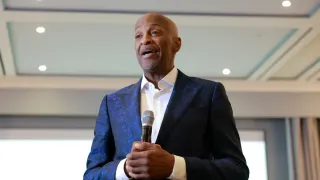
October 27, 2025
The East Wing of the White House Is Gone. Here's a Look at Some of the History Made There
Darlene Superville READ TIME: 5 MIN.
Betty Ford reportedly said that if the White House West Wing is the “mind” of the nation, then the East Wing — the traditional power center for first ladies — is the “heart.”
That “heart” beat for more than 100 years as first ladies and their teams worked from their East Wing offices on everything from stopping drug abuse and boosting literacy to beautifying and preserving the White House itself. It's where they planned White House state dinners and brainstormed the elaborate themes that are a feature of the U.S. holiday season.
That history came to an end after wrecking crews tore down the wing's two stories of offices and reception rooms last week. Gone is an in-house movie theater, and a covered walkway to the White House captured in so many photos over the years. An East Wing garden that was dedicated to Jacqueline Kennedy was also uprooted, photographs show.
Republican President Donald Trump ordered the demolition as part of his still-to-be approved plan to build a $300 million ballroom.
The former real estate developer has long been fixated on building a big White House ballroom. In 2010, he called a top adviser to Democratic President Barack Obama and offered to build one. Trump made no secret of his distaste for the practice of hosting elegant White House state dinners underneath tents on the South Lawn. The offer was not followed up on.
Now Trump, in his second term, is moving quickly to see his wish for what he calls a “great legacy project” become reality. He has tried to justify the East Wing tear-down and his ballroom plans by noting that some of his predecessors also added to the White House over the years.
First ladies and their staffs witnessed history in the East Wing, a “place of purpose and service,” said Anita McBride, who worked there as chief of staff to first lady Laura Bush.
“Tearing down those walls doesn’t diminish the significance of the work we accomplished there,” McBride told The Associated Press.
McBride said she supports a ballroom addition because the “large and expensive tent option” that has been used when guest lists stretched longer than could be comfortably accommodated inside the White House “was not sustainable.” Tents damage the lawn and require additional infrastructure to be brought in, such as outdoor bathrooms and trolleys to move people around, especially in bad weather, she said.
Others feel differently.
Krish O’Mara Vignarajah, who was policy director for first lady Michelle Obama, said the demolition was a “symbolic blow” to the East Wing's legacy as a place where women made history.
“The East Wing was this physical space that had seen the role of the first lady evolve from a social hostess into a powerful advocate on a range of issues,” she said in an interview.
Here's a look at some of the history that came out of the East Wing and the first ladies who spent time there:
Rosalynn Carter
She was the first first lady to have her own office in the East Wing. Most first ladies before Carter had worked out of the private living quarters on the second or third floor of the residence. Carter wanted a place where she could separate work and home.
“I always need a place to go that is private, where I don't have to dress and don't have to put on makeup,” she wrote in her memoir. “The offices of the staff of the first lady were always in the East Wing, and it seemed a perfect place for my office too.”
In her memoir, Carter wrote about her favorite route to her office in winter months. She walked through the basement, past laundry rooms and workshops and the bomb shelter kept for the president and his staff. The thermostats in the residence above had been turned down low because of President Jimmy Carter's energy conservation program, making the East Wing so cold that she was forced to wear long underwear.
The subterranean passageway shown to her by a residence staffer provided some relief. “With Jimmy's energy conservation program, it was the only really warm place in the White House, with large steam pipes running overhead,” the first lady wrote.
Nancy Reagan
Photos from the East Wing in the early 1980s show the first lady meeting with staff, including her press secretary, Sheila Tate. For a generation of Americans, Nancy Reagan was most closely associated with a single phrase, “Just Say No," for the anti-drug abuse program she made a hallmark of her White House tenure.
As Reagan once recalled, the idea for the campaign emerged during a 1982 visit with schoolchildren in Oakland, California. “A little girl raised her hand and said, ‘Mrs. Reagan, what do you do if somebody offers you drugs?’ And I said, ‘Well, you just say no.’ And there it was born.”
Hillary Clinton
Clinton bucked history by becoming the first first lady to insist that her office be in the West Wing, not the East Wing. In her memoir, Clinton wrote that wanted her staff to be “integrated physically” with the president's team. The first lady's office relocated to what is now the Eisenhower Executive Office Building while Clinton was assigned an office on the second floor of the West Wing.
“This was another unprecedented event in White House history and quickly became fodder for late night comedians and political pundits,” Clinton later wrote.
Laura Bush
Bush wrote in her memoir about what it was like at the White House after the Sept. 11 attacks. Most of her staff members, then in their 20s, “kicked off their high heels and fled from the East Wing” after they were told to “run for their lives” when reports suggested the White House was a target.
“Now they were being asked to come back to work in a building that everyone considered a target and for a presidency and a country that would be at war,” she wrote.
Michelle Obama
Obama was the first Black woman to serve as first lady, becoming a global role model and style icon who advocated for improved child nutrition through her “Let's Move” initiative. She and her staff in the East Wing also worked to support military families and promote higher education for girls in developing countries.
Photos from the time show Obama typing on a laptop during an online chat about school nutrition and the White House garden she created.
Melania Trump
Trump pushed the boundaries of serving as first lady by not living at the White House during the opening months of Donald Trump's first term. She stayed in New York with their then-school-age son, Barron, so he wouldn't have to switch schools midyear. When she eventually moved to the White House, she and her East Wing aides launched an initiative named, “Be Best,” to focus on child well-being, opioid abuse and online safety.
Jill Biden
Biden was the first first lady to continue a career outside the White House. The longtime community college English professor taught twice a week while serving as first lady. But in her East Wing work, she was an advocate for military families; her late father and her late son Beau served in the military. Biden also advocated for research into a cure for cancer and secured millions of dollars in federal funding for research into women's health.






